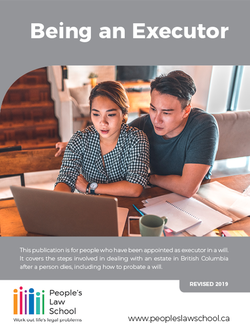Being an Executor: Difference between revisions
No edit summary |
Drew Jackson (talk | contribs) No edit summary |
||
| Line 10: | Line 10: | ||
* '''[[Being Asked to Be an Executor]]''' | * '''[[Being Asked to Be an Executor]]''' | ||
** | ** [[Being Asked to Be an Executor#Being an executor can be a demanding job|Being an executor can be a demanding job]]{{·}}[[Being Asked to Be an Executor#You don’t have to act as executor|You don’t have to act as executor]]{{·}}[[Being Asked to Be an Executor#If you decide to act as executor, you can get help|If you decide to act as executor, you can get help]]{{·}}[[Being Asked to Be an Executor#There are some expenses and fees you can claim|There are some expenses and fees you can claim]]{{·}}[[Being Asked to Be an Executor#There can be more than one executor|There can be more than one executor]]{{·}}[[Being Asked to Be an Executor#An executor’s role ends when the court formally discharges them|An executor’s role ends when the court formally discharges them]]{{·}}[[Being Asked to Be an Executor#If you agree to being someone’s executor|If you agree to being someone’s executor]] | ||
* '''[[Ten Steps to Being an Executor]]''' | * '''[[Ten Steps to Being an Executor]]''' | ||
Revision as of 21:59, 21 March 2019

|
|
This is a Clicklaw Wikibook, a collaborative, plain language legal publication that is updated as a wiki and can be printed or downloaded. |
|
|
Download the full Wikibook in PDF. |
|
|
Customize: take what you need, leave the rest (learn more). |
Being an Executor from People's Law School is for people who have been appointed as executor in a will. It covers the steps involved in dealing with an estate in British Columbia after a person dies, including how to probate a will. The information reflects the Wills, Estates and Succession Act, which became law in 2014.
Contents
- Being Asked to Be an Executor
- Being an executor can be a demanding job · You don’t have to act as executor · If you decide to act as executor, you can get help · There are some expenses and fees you can claim · There can be more than one executor · An executor’s role ends when the court formally discharges them · If you agree to being someone’s executor
- Ten Steps to Being an Executor
- Step 1. Find the will · Step 2. Confirm the validity of the will · Step 3. Protect the assets · Step 4. Arrange the funeral · Step 5. Communicate with the beneficiaries · Step 6. List the assets and liabilities · Step 7. If necessary, apply for probate · Step 8. Deal with debts and taxes · Step 9. Account to the beneficiarie · Step 10. Distribute the estate
- Resources
Copyright & Disclaimer
![]() Being an Executor © People’s Law School is, except for the images, licensed under a Creative Commons Attribution-NonCommercial-ShareAlike 2.5 Canada Licence.
Being an Executor © People’s Law School is, except for the images, licensed under a Creative Commons Attribution-NonCommercial-ShareAlike 2.5 Canada Licence.
At People's Law School, we believe accurate, plain English information can help people take action to work out their legal problems. This resource explains in a general way the law that applies in British Columbia. It is not intended as legal advice. For help with a specific legal problem, contact a legal professional. Some sources of legal help are highlighted in the "Where to Get Help" section.
People's Law School

People's Law School is a non-profit society in British Columbia providing free education and information on the legal problems of daily life.